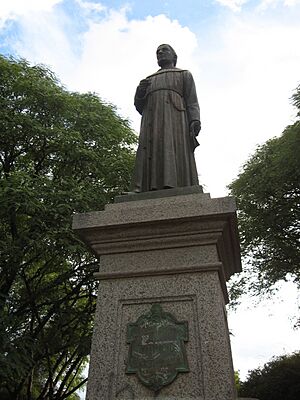Cayetano José Rodríguez facts for kids
Cayetano José Rodríguez (born 1761, died 1823) was an important person in Argentina's history. He was a priest, a writer, and a poet. He also helped Argentina become an independent country. Cayetano Rodríguez was a representative at the Congress of Tucumán in 1816. This meeting declared Argentina's independence from Spain.
Contents
Who Was Cayetano Rodríguez?
Early Life and Education
Cayetano Rodríguez was born in San Pedro, a town in Buenos Aires Province. When he was 16, he joined the Franciscan Order. This is a group of Catholic priests and brothers. He became a priest in 1783.
He studied at the National University of Córdoba. There, he taught subjects like theology and philosophy. In 1790, he moved back to Buenos Aires. He continued teaching at the Franciscan convent.
Working for the Revolution
Cayetano Rodríguez was very impressed by the people who wanted Argentina to be free. These people were called patriots or revolutionaries. He even wrote a poem for the slaves who helped defend the city. This was during the British invasions.
He became a close friend and teacher to Mariano Moreno. Moreno was another important leader of the revolution. In 1810, Rodríguez was put in charge of the public library. He held this job until 1814. Even though he worked for the revolution, he was also a leader in the Franciscan Order.
A Voice for Independence
In 1811, Cayetano Rodríguez became a provincial minister. This was an important role in the government. He also joined the Assembly of 1813. This assembly was a big meeting to decide Argentina's future. He was elected to the General Constituent Assembly in 1813. He also edited the assembly's newspaper.
In 1815, the city of Buenos Aires chose him to go to the Tucumán Congress. This was a very important meeting. He suggested creating a committee to write Argentina's constitution. Many people believe that Cayetano Rodríguez himself wrote the Declaration of Independence. He was the editor of the Congress's papers.
Later Life and Journalism
After the Congress, Rodríguez went back to his religious duties. He also continued his public work. In 1822, he started a newspaper called El Oficial del Día. He used this newspaper to support the church. He also used it to share his beliefs. This was against another newspaper, El Centinela. That paper supported church reforms and the government of Rivadavia.
 | James Van Der Zee |
 | Alma Thomas |
 | Ellis Wilson |
 | Margaret Taylor-Burroughs |


